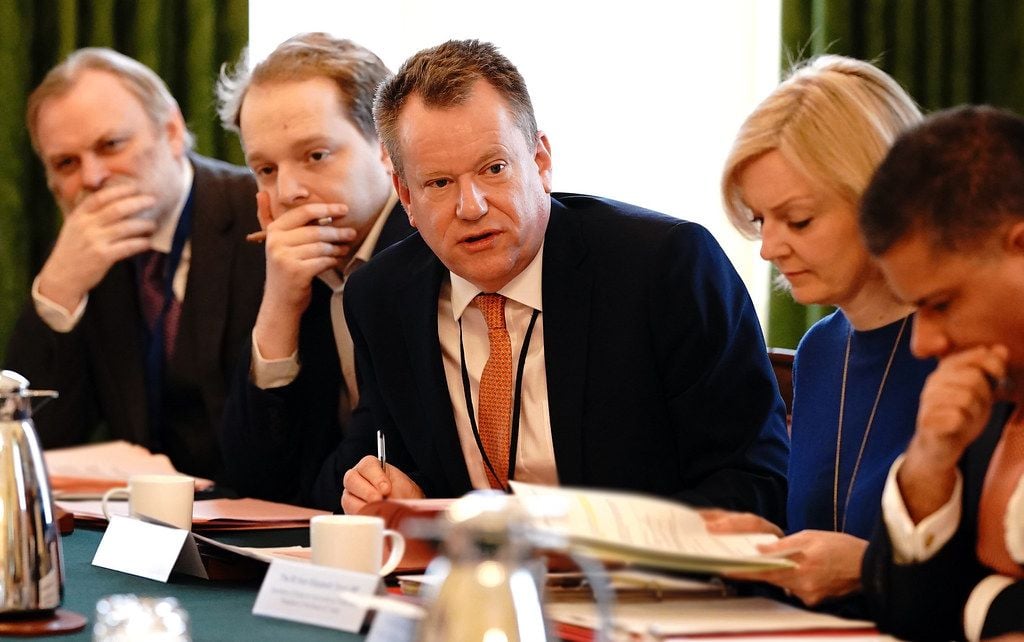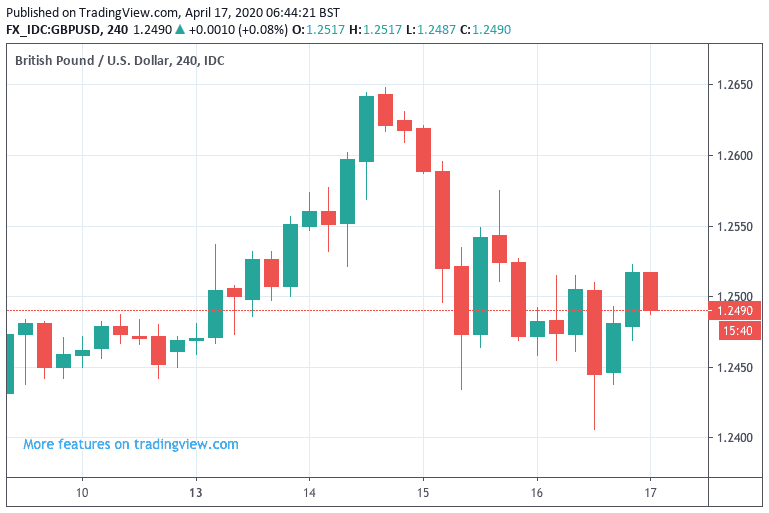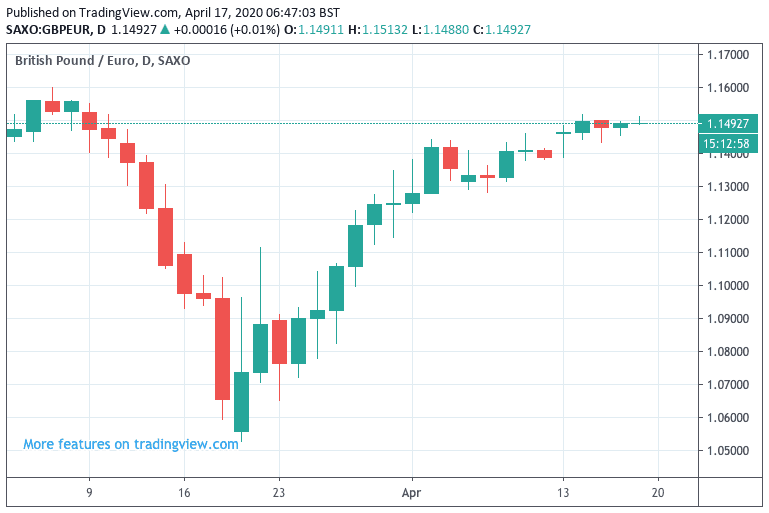UK's Frost says Won't Ask for Brexit Transition Extension, Ensures Brexit Anxiety in Play for Pound Sterling
- UK will prefer to leave EU on WTO terms: BMO Capital's Gallo
- GBP steady ahead of the weekend
- But significant downside risks lie ahead says another analyst
- Latest GBP/EUR and GBP/USD bank consensus forecasts now available at Global Reach

File Image of the UK's chief trade negotiator, David Frost. Image © Gov.uk, 10 Downing St
![]() - Spot GBP/EUR rate at time of writing: 1.1493
- Spot GBP/EUR rate at time of writing: 1.1493
- Bank transfer rates (indicative): 1.1191-1.1271
- FX specialist rates (indicative): 1.1322-1.1390 >> More information![]() - Spot GBP/USD rate at time of writing: 1.2492
- Spot GBP/USD rate at time of writing: 1.2492
- Bank transfer rates (indicative): 1.2155-1.2242
- FX specialist rates (indicative): 1.2370-1.2380 >> More information
The British Pound has stabilised in value ahead of the weekend following two days of declines against the Euro and Dollar, which have come amidst deteriorating global investor sentiment and the return of Brexit headwinds.
The outlook for the currency remains firmly fixed on the broader global mood music concerning the coronavirus and the prospect of the securing of a Brexit trade deal before a year-end deadline, an issue that should start become more prominent a driver of Sterling ahead of the June European Council meeting.
A fading of Sterling's two-week rally over the past two days coincides with the return of Brexit as a factor to consider, following its hiatus since the outbreak of the coronavirus pandemic.
Attempts to negotiate a trade deal were torpedoed after covid-19 impacted both of the chief negotiators, but this week has seen Michel Barnier and David Frost return to work and agree three more rounds of negotiations that will be conducted via video link.
The deadline for the two sides to agree on any extension to the one-year transition period falls ahead of the European Council meeting in June, and concerns have risen of late that there is simply not enough time to make progress before this meeting.
"The path is now a lot more ambiguous, and FX investors have typically reacted to Brexit uncertainty by selling the GBP against everything else," says Stephen Gallo, European Head of FX Strategy at BMO Capital.
"GBP dealers should fear July 1, when it will be too late to extend the Brexit transition past Dec. 31, 2020, and GBP would rightly suffer. The UK government has been vehement about not asking for an extension, and the UK parliament won't be able to force one this time, since Prime Minister Boris Johnson's huge Conservative majority will back his decision," says Richard Pace, an options analyst at Thomson Reuters," adding:
"Dealers don't seem to appreciate the gravity of this risk, with coronavirus taking centre stage, but GBP is likely to suffer as July approaches and take a big hit thereafter if Boris isn't bluffing and puts Britain on course for a no-deal Brexit just six months later."
Above: GBP/USD performance over the past week (4 hour chart).
Expect anxieties on the matter to increasingly become a headwind for Sterling over coming weeks, while the agreeing of a deadline could on the other hand offer the Pound a boost.
"With the chief Brexit negotiators on both side of the channel falling victim to the virus last month and with other politicians understandably focused on the Covid crisis, it has created a delay to the post-Brexit negotiations. The consequence of the delay has been a step up in speculation that the UK government may, after all, request an extension to the transition phase beyond the end of this year," says Jane Foley, Senior FX Strategist at Rabobank.
For now however, the UK looks unwilling to budge on its position that the transition period ends at the turn of the year.
"As we prepare for the next rounds of negotiations, I want to reiterate the Government's position on the transition period created following our withdrawal from the EU. Transition ends on 31 December this year. We will not ask to extend it. If the EU asks we will say no," said David Frost, the UK's chief negotiator on Thursday.
"Extending would simply prolong negotiations, create even more uncertainty, leave us liable to pay more to the EU in future, and keep us bound by evolving EU laws at a time when we need to control our own affairs. In short, it is not in the UK's interest to extend," added Frost.
BMO Capital believe the prospect of a WTO exit from the transition by the end of 2020 has increased, with Gallo saying that the UK could find it an acceptable trade-off when emerging from the wake of the coronacrisis:
"Is the cost of moving to WTO trading terms with the European Union high enough that it would justify extending the transition period and getting bogged down in negotiations concerning the EU’s Level Playing Field demands, EU rules on state aid, European Court of Justice jurisdiction, non-regression on existing EU laws and reciprocal access to fishing waters?"
"We are leaning towards 'no', as well as looking at this issue on the basis of 'expended energy'," says Gallo.
Gallo says that with all the other moving parts the UK government has to now deal with, it will want all the available levers at its disposal to help it repair from the coronacrisis and can ill afford to expend energy and prolong uncertainty through protracted trade negotiations.
"Put simply, on the other side of COVID-19, both the UK and Brussels will be in a state of repair. In the UK, the appetite to deal with Brexit negotiations could be very low, and Brussels will probably be even less inclined to cede ground to the UK’s demands in the negotiations than it was before," says Gallo.
For Sterling such an outcome would likely create layers of uncertainty that ensures it ultimately underperforms its peers, particularly in the second half of 2020 with peak anxiety arriving ahead of the year-end deadline.
We are looking at another interesting year for those with skin in the Sterling market.
"In the weeks ahead, GBP will be focused on how deep the coronavirus downturn is likely to be and how quickly the economy can recover. Overlaying this picture will be the direction of the post-Brexit negotiations. On balance we expect that these talks and the uncertainties connected with issues such as border and immigration procedures have the potential to increase the vulnerability of the pound in the months ahead," says Foley.
End of the Rally?
For those looking to sell sterling and buy either dollars or euros, the past two weeks have seen their purchasing power steadily improve following what was a dire first half of March for Sterling. The recovery came as markets calmed down and investors started to believe the end to the 'coronacrisis' was in sight.
However, this week has put the recovery on hold as fears concerning the outlook for the global economy make an unwelcome return.
The Pound and all other currencies are now being primarily directed by shifts in market sentiment with Sterling falling against the Dollar, Yen and Franc in times of heightened anxiety, something that has increased this week as expectations for the global economy to suffer a sharp recession increases on the back of incoming data and analysis.
Any further deterioration in sentiment will almost certainly hurt the UK currency further and therefore now could be a good time to take advantage of the recent recovery in Sterling as there remains the prospect it could capitulate once more.
Above: The daily GBP/EUR chart shows compression, could a big move either way be on the cards?
However those looking to buy currencies such as the New Zealand and Australian Dollar using Sterling could see better rates ahead as these currencies tend to perform poorly in times of general market anxiety.
The flip side to all the above is that more good news concerning the coronavirus pandemic emerges and reignites Sterling's rally and in turn disadvantages the Dollar once more.
In short, these are difficult market conditions to navigate and there is a great deal of uncertainty regarding the outlook.
Ahead of the weekend the Pound-to-Euro exchange rate is quoted at 1.1497 while the Pound-to-Dollar exchange rate is quoted at 1.2493.






